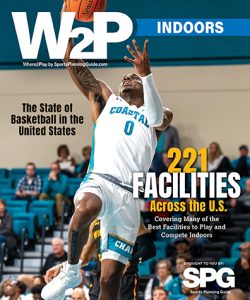From new NBA arena plans to youth sports complex expansions, see how new venues and renovations are shaping sports tourism and community growth nationwide
Stay ahead of the game and discover cutting-edge innovations in the latest sports facility news.
Mavericks narrow search for new Dallas, Texas arena to two potential sites
The Dallas Mavericks are exploring two possible Dallas sites for a new, basketball-specific arena and surrounding entertainment district, though team CEO Rick Welts emphasized neither location is a finalist. The team, owned by the Adelson family and Las Vegas Sands Corporation, envisions a state-of-the-art venue on 30 to 50 acres, with a goal to secure a site by late 2025 or early 2026. While the Mavericks remain under contract at the 20,000-seat American Airlines Center through 2031, ownership believes the arena is aging and wants a facility to carry the franchise into the next 30 years.
Speculation points to potential sites near the Dallas Convention Center redevelopment, the former Valley View Center, or the Dallas County jail property. However, the team has yet to confirm any serious contenders. The Stars, the NHL co-tenant at American Airlines Center, appear content to remain, citing the benefits of the downtown location and existing arena district.
The project’s momentum follows a turbulent Mavericks season marked by injuries, controversy and a playoff miss after last year’s Finals run. Despite the setbacks, Welts reiterated the team’s commitment to keeping the arena within Dallas city limits, promising a signature project reflective of the Adelson family’s global development portfolio.
Charleston, West Virginia’s Shawnee Sports Complex debuts Welcome Center to boost tourism and visitor experience
Shawnee Sports Complex in Charleston, West Virginia, is adding a major new feature with the recent opening of its Welcome and Tourism Center. Since its debut in 2018, the complex has generated more than $150 million in economic impact, drawing teams from across the country and raising the profile of Kanawha County as a sports tourism destination. The new building, developed through a partnership between the Kanawha County Commission, Charleston Area Alliance, ZMM Architects and Engineers and Pray Construction, is designed to both meet the growing needs of the facility and serve as a focal point for visiting athletes and families.
Local leaders see the expansion as more than just an amenity upgrade—it’s a strategy to keep visitors coming back. Commission president Ben Salango said the goal is for every visiting team to leave with a great experience and plans to return. He believes Shawnee’s success is evident in the way other communities are trying to replicate it.
The ribbon cutting included tours, food and entertainment, but the celebration was just the start. More improvements are already planned to build on the complex’s momentum. Salango noted that Shawnee is now part of Charleston’s pitch to new residents and professionals, helping showcase the city’s vibrant quality of life alongside its cultural and sports assets.
Northwestern University’s $850 million Ryan Field set to elevate the Wildcats football program
Northwestern football’s new home is taking shape in Evanston, Illinois, with the $850 million Ryan Field set to open in 2026—exactly a century after the original stadium’s debut. Backed by $480 million from the Ryan family, the privately funded, 35,000-seat venue promises state-of-the-art amenities, close-up sightlines and a canopy to protect every fan from the elements. The design aims to deliver “premium for everyone,” replacing outdated facilities once considered the Big Ten’s worst.
Yet the Wildcats’ on-field record casts a shadow over the optimism. Under head coach David Braun, Northwestern sits at 12-13 overall, with recent seasons marred by inconsistent play and a winless history at Wrigley Field. Athletic Director Mark Jackson acknowledges the challenge: a world-class facility means little without a competitive team capable of defending its home turf.
Still, the project reflects Northwestern’s ambition to elevate its football program in an era of seismic changes to college athletics. Whether Ryan Field becomes a fortress or just a beautiful backdrop for Illinois will depend on whether the Wildcats can match their promise with performance.
Blackout Sports Fieldhouse, a massive new indoor sports complex in Grand Junction, Colorado, to open August 23
Upgrade your planning process by exploring fresh insights and best practices in sports facility news.
University of Houston unveils its sleek $130M football complex
Houston football just raised the bar with the unveiling of its $130 million Memorial-Hermann Football Operations Center, a state-of-the-art facility designed to cement the Cougars’ status in the Big 12. Opened on schedule in the program’s third year in the conference, the complex features a 20,000-square-foot weight room, academic support spaces, locker rooms and offices, plus premium fan amenities at TDECU Stadium, including 14 suites, an 11,000-square-foot club and a 350-seat rooftop terrace. Players called it “the new standard,” while head coach Willie Fritz touted it as the premier standalone football facility in Texas.
The new center also provides direct access to the Cougars’ indoor practice field—a feature Fritz says will be a “game-changer” for recruiting and athlete development. Houston has already reaped benefits on the recruiting trail, landing the nation’s 27th-ranked transfer portal class, headlined by quarterback Conner Weigman and tight end Tanner Koziol.
Houston’s upgrade mirrors a broader facilities boom across Texas football. Texas Tech debuted a $240 million “football resort” in March, Texas A&M revitalized its athletic spaces through a $120 million campaign, and Texas, UNT and UTSA are all investing heavily in modernizing their programs to attract top-tier talent in an increasingly competitive landscape.
Plans for new Decorah, Iowa sports complex to move forward after extended fundraising campaign
Decorah City Council confirmed plans to build a new sports complex but opted to delay awarding the construction bid until Monday, August 18, to give fundraising efforts more time. The pause allows the project’s committee to potentially fund extra amenities, ensuring the final design delivers maximum community benefit. City leaders emphasized the project is moving forward, with the first phase already set to include two 280-foot ball diamonds and eight pickleball courts.
If donations increase, upgrades could include a third ball field, sod for one diamond, batting cages and higher quality pickleball court surfaces. The city’s preferred contractor, Skyline Construction, submitted a winning bid of $2.09 million, which is over 20% below the original estimate, after cost-saving adjustments were made to the design.
Fundraising for the new Iowa facility peaked at $500,000 since spring, with organizers optimistic about more contributions, especially from pickleball players eager for a premium concrete surface. Council members expressed gratitude for community support and encouraged continued input as Decorah finalizes plans for a facility designed to serve both residents and the wider Freeport area.
Upgraded Lindner Family Tennis Center in Cincinnati, Ohio shows off impressive $260 million renovation
The Cincinnati Open is set to debut a dramatically expanded and upgraded Lindner Family Tennis Center when play begins in 2025. Following a $260 million renovation completed in under a year, the venue now features a 56,000-square-foot player center, a new 2,000-seat sunken stadium and 31 courts—up from 17 in 2023—including a six-court indoor facility. The upgrades were essential to accommodate the tournament’s shift to a two-week format, with player fields growing from 56 to 96 for both tours and an expected 1,500–1,600 people on-site when factoring in coaches and support staff.
Fans will also see major enhancements to spectator experience. Ten new courts on the south side now have surrounding stands, and additional seating on the north side brings visitors closer to practice sessions. The Pavilion in the heart of campus offers a 28-foot video screen, autograph opportunities and new social spaces. The grounds now also include six pickleball and two padel courts, expanding the range of activities available during the event.
The upgrades reflect Beemok Capital’s long-term vision for the facility as a year-round hub for tennis and racket sports in the Midwest. Beyond hosting the Cincinnati Open, the venue will stage junior tournaments, the OHSAA state championships and community programming. By early 2026, plans call for fully operational tennis and pickleball courts, a restaurant and ongoing events designed to inspire both elite athletes and local players to pick up a racket.
Stay on the pulse of the industry with the most recent developments and ideas in sports facility news.






